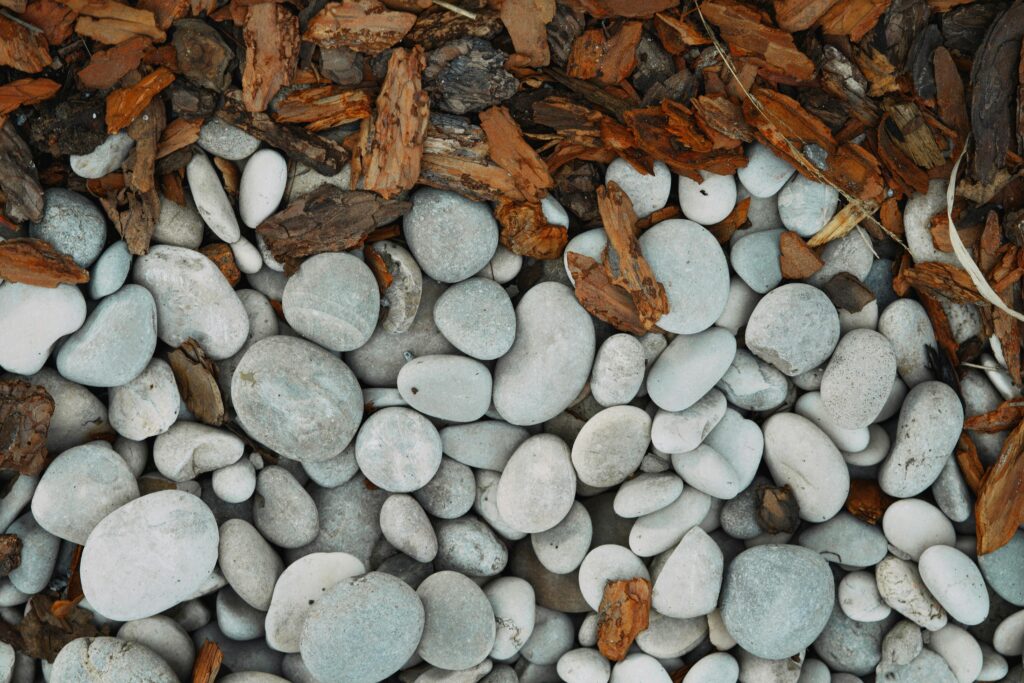When it comes to landscaping, many homeowners focus on curb appeal — but there’s another important factor to consider: how your landscaping choices affect your home’s safety and insurance inspections. One of the biggest debates? Stones vs. mulch.
While both materials have their benefits, understanding the risks and rewards can help you make smarter choices that protect your property and avoid costly issues down the road.
Mulch: The Pros and Cons
Mulch is a popular choice for good reason. It offers several valuable benefits:
- Moisture Retention: Mulch helps keep the soil around your plants moist, reducing the need for frequent watering.
- Temperature Control: It acts as an insulating layer, protecting plant roots from extreme heat or cold.
- Weed Suppression: A thick layer of mulch can help limit weed growth, keeping your landscape tidy.
However, mulch isn’t without its downsides — especially when it comes to home protection:
- Insect Attraction: Mulch can create a moist, warm environment that invites termites, ants, and other insects closer to your home. This increases the risk of infestations, which can threaten your home’s structural integrity.
- Fire Hazard: Some types of mulch, especially wood-based ones, are flammable and can be a risk during dry seasons.
- Maintenance Needs: Organic mulch breaks down over time, meaning it needs to be replaced regularly to maintain effectiveness.
Stones: The Safer Alternative for Home Protection
On the other hand, decorative stones and gravel offer several advantages when placed near your home:
- Insect Deterrence: Unlike mulch, stones do not provide food or shelter for insects, helping to keep pests at bay.
- Fire Resistance: Rocks are non-flammable, offering a safer perimeter around your home, especially important in areas prone to wildfires or dry seasons.
- Low Maintenance: Stones don’t decompose, which means less frequent replacement and longer-lasting coverage.
- Durability: Stones can withstand harsh weather and still maintain a clean, polished look.
However, stones can have some drawbacks:
- Higher Initial Cost: Installing stones typically costs more upfront compared to mulch.
- Temperature Impact: Rocks can absorb and radiate heat, which may stress nearby plants if not managed properly.
What Home Inspectors Look For
During an inspection, especially for insurance purposes, inspectors often assess factors that could impact the home’s safety and longevity. Landscaping is no exception. Mulch placed too close to the home’s foundation is a red flag for pest activity and moisture problems. Conversely, a stone barrier around the home is often seen as a positive step toward reducing risks.
In some cases, switching to stones near your foundation and using mulch farther out in the yard can give you the best of both worlds — moisture retention for your plants and a safer perimeter for your home.
Final Thoughts
While both stones and mulch have their place in landscaping, stones are the safer choice when installed close to your home’s foundation. They reduce fire risks, discourage insects, and require less maintenance — all things that can help you during a home or insurance inspection.
At Top-Sider Inspections, we’re committed to helping homeowners protect their biggest investment. We specialize in Wind Mitigation Inspections, 4-Point Inspections, and Roof Certifications throughout Polk, Hillsborough, and surrounding areas.
If you’re preparing for an insurance renewal, buying a new home, or just want peace of mind, trust Top-Sider Inspections to deliver a thorough, reliable inspection every time.
Contact us today to schedule your inspection and protect your home with confidence!

